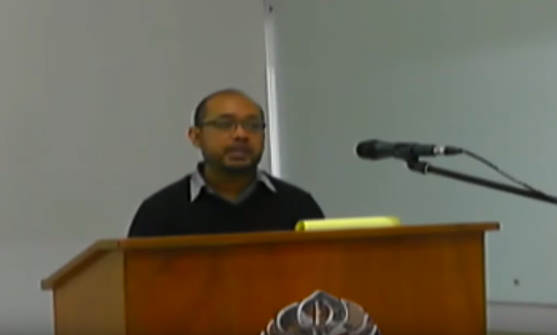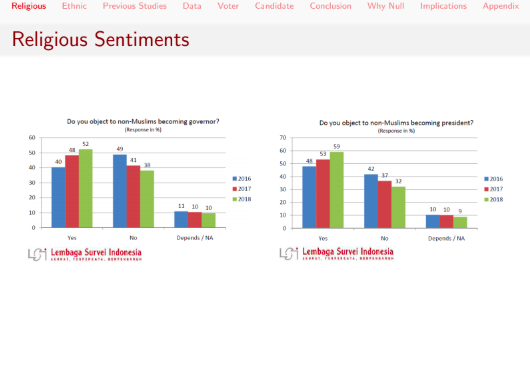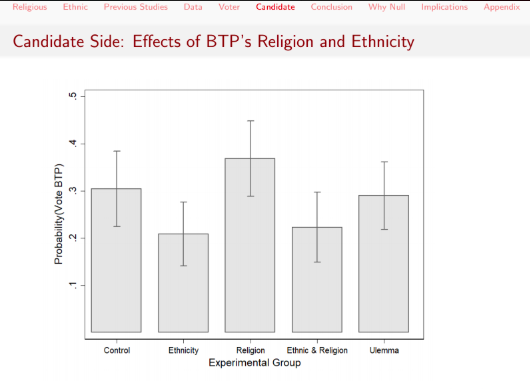 The imprisonment of Jakarta’s former governor, Basuki Tjahaja Purnama (BTP), who is a Christian and is of Chinese descent, raised a question of how Muslims in a Muslim-majority society, such as Indonesia, respond to a double minority (i.e. ethnic and religious minority) political candidate. In an attempt to understand this behaviour, Nathanael Sumaktoyo (University of Notre Dame) conducted a study observing the behaviour of potential voters of Jakarta’s 2017 gubernatorial election. This study was presented in an FKP seminar on Tuesday, 16 July 2019 in Jakarta.
The imprisonment of Jakarta’s former governor, Basuki Tjahaja Purnama (BTP), who is a Christian and is of Chinese descent, raised a question of how Muslims in a Muslim-majority society, such as Indonesia, respond to a double minority (i.e. ethnic and religious minority) political candidate. In an attempt to understand this behaviour, Nathanael Sumaktoyo (University of Notre Dame) conducted a study observing the behaviour of potential voters of Jakarta’s 2017 gubernatorial election. This study was presented in an FKP seminar on Tuesday, 16 July 2019 in Jakarta.
 According to a survey by Lembaga Survei Indonesia (LSI), the proportion of Jakartans who responded that they object to a non-Muslim governor or president has increased every year from 2016 to 2018. A common justification of this view is the belief that it is haram (i.e. forbidden) for Muslims to be led by a person of other faiths. Despite it being a widespread view, the movement was relatively unorganized until the surfacing of BTP’s speech made in a gathering in Kepulauan Seribu, which led to the blasphemy allegation in September 2016. The video was circulated and edited to only show BTP saying to a group of people “not to be fooled by the Quran”. This video was successful in inviting resistance against BTP in the form of mass demonstrations. After losing the election, BTP was sentenced for two years in prison and resigned from his post.
According to a survey by Lembaga Survei Indonesia (LSI), the proportion of Jakartans who responded that they object to a non-Muslim governor or president has increased every year from 2016 to 2018. A common justification of this view is the belief that it is haram (i.e. forbidden) for Muslims to be led by a person of other faiths. Despite it being a widespread view, the movement was relatively unorganized until the surfacing of BTP’s speech made in a gathering in Kepulauan Seribu, which led to the blasphemy allegation in September 2016. The video was circulated and edited to only show BTP saying to a group of people “not to be fooled by the Quran”. This video was successful in inviting resistance against BTP in the form of mass demonstrations. After losing the election, BTP was sentenced for two years in prison and resigned from his post.
These series of events are often used by politicians and religious elites to enforce the rhetoric that religion plays an important factor in Indonesian elections. Despite some truth in the statement, this rhetoric also belies Jakarta’s and Indonesia’s long history of anti-Chinese sentiments. A study by Setijadi (2017) found that respondents from all levels of education reported that they would be uncomfortable with a Chinese Indonesian in a position of political leadership, though the percentage lowers as the level of education rises. A similar result was also found when the respondents were divided by income group. This shows that negative sentiments towards people of Chinese descent are present regardless of education and income levels. Historically, the darkest example of the sentiments faced by Chinese Indonesians is the May 1998 tragedy, in which many Chinese Indonesians were raped, murdered, and their business were looted, vandalized, and burned.
Nathanael conducted a survey of of 1,047 Jakartan Muslims and used the approach of a feeling thermometer to ask respondents whether they would vote for BTP, whether they like Christians, and whether they like ethnic Chinese people. He found that the last two questions are very strongly correlated, thus indicating the importance of disentangling the influence of each factor. Assessed individually, Nathanael found that the more positive a respondent’s feeling towards ethnic Chinese people and Christians, the more likely they are to support BTP. However, when both factors are taken into account, a respondent’s feelings toward Christians loses its significance. In other words, respondents’ feelings for ethnic Chinese people play a bigger role than their feelings toward Christians in their vote for BTP.
Nathanael also conducted an experiment, in which respondents are divided into five groups and were asked different versions of a similar question:
- Control group: Ahok (i.e. former nickname of BTP) is one of the candidates running in the Jakarta gubernatorial election in February. Will you vote for Ahok as governor of Jakarta?
- Ethnicity: Ahok is one of the candidates running in the Jakarta gubernatorial election in February, as we know, Ahok is of Chinese descent. Will you vote for Ahok as governor of Jakarta?
- Religion: Ahok is one of the candidates running in the Jakarta gubernatorial election in February, as we know, Ahok is a Christian. Will you vote for Ahok as governor of Jakarta?
- Ethnicity-religion: Ahok is one of the candidates running in the Jakarta gubernatorial election in February, as we know, Ahok is of Chinese descent and a Christian. Will you vote for Ahok as governor of Jakarta?
- Ulema: Ahok is one of the candidates running in the Jakarta gubernatorial election in February, as we know, Ahok is a Christian and several ulemas prohibit voting for non-Muslim leaders. Will you vote for Ahok as governor of Jakarta?
Each treatment primes respondents of different characteristics of the candidate. This experiment showed that ethnicity is the only significant factor that influences voter behaviour. Priming respondents with information about BTP’s ethnicity is found to reduce their support by 10 percentage points. If respondents are already aware that BTP is a Christian, reminding them that he is of Chinese descent reduces their support by 12 percentage points. This shows that not only do voters care more about ethnicity, it is also possible that religious beliefs are used as a pretext for voters’ ethnic sentiments.
For the complete presentation and Q&A session, please refer to the video and materials provided.





